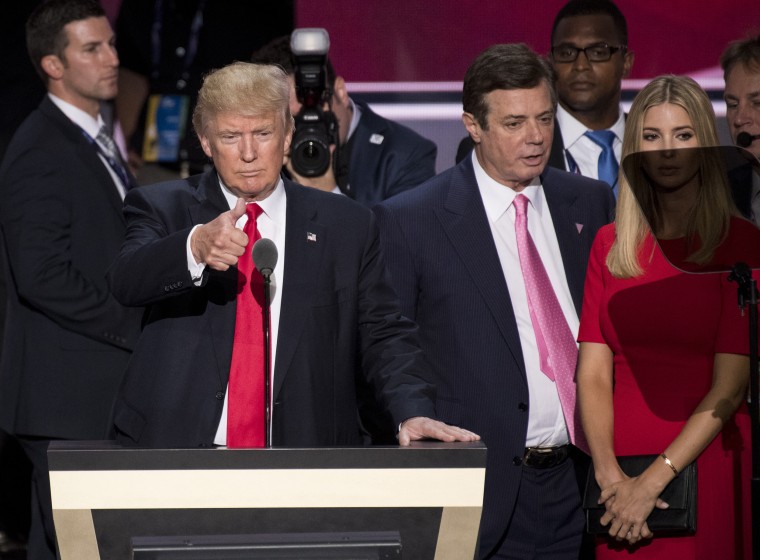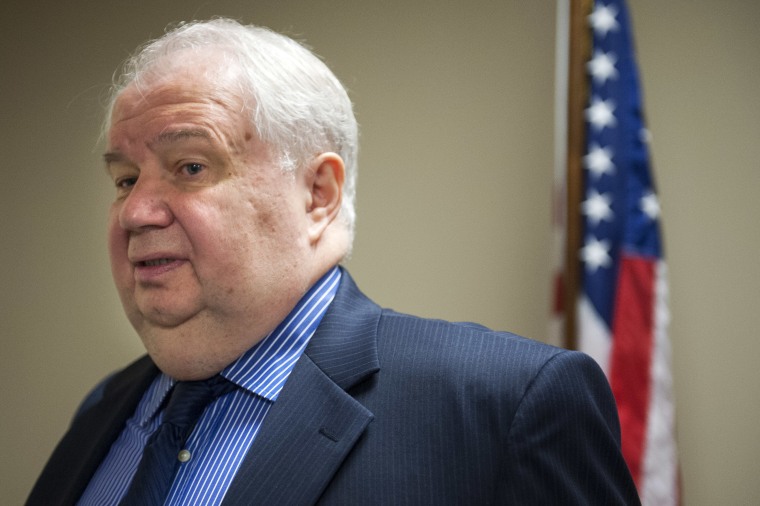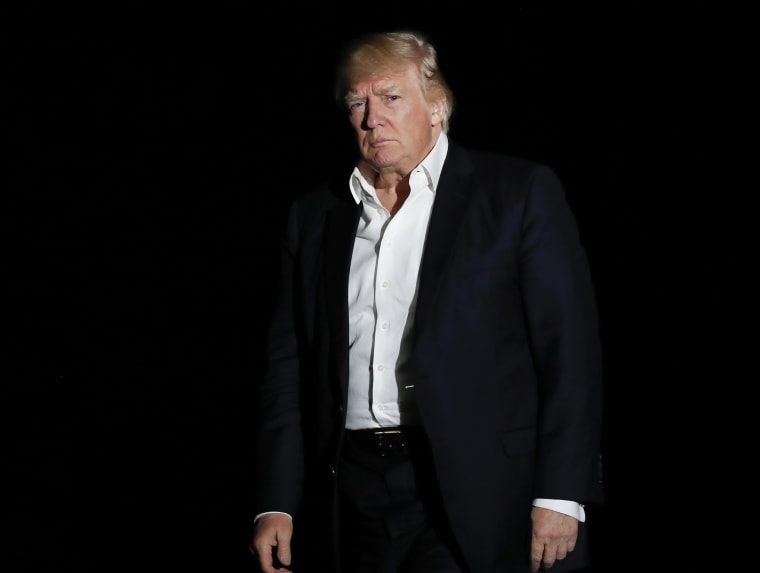What's the latest on the Russia investigation and where does fired FBI Director James Comey fit in?
President Donald Trump’s decision to terminate Comey sent shockwaves through Washington on Tuesday, with many senior Democrats accusing the White House of undermining the agency’s investigation into whether the Trump campaign colluded with Russia to prevent Hillary Clinton’s election.
There are, in fact, multiple ongoing storylines and investigations related to Russia so it’s worth taking a moment to break them out individually and see how Comey’s ouster intersects with them.
Russian hacking
The main investigation stems from the 2016 presidential election.
During the campaign, Wikileaks published emails stolen from Democratic officials and Clinton’s campaign chairman John Podesta. The U.S. intelligence community concluded that Russian leader Vladimir Putin had ordered the hacking, likely to undermine Clinton and boost Trump. The Office of the Director of National Intelligence issued a public report on its findings in January and the conclusion was backed by Comey’s FBI, as well as the CIA and NSA.
The findings upset Trump, who had said he would pursue closer ties with Putin during the campaign and publicly called on Russia to release Clinton’s emails. He refused to blame Russia for the hack attack during the race and later claimed the attention devoted to their meddling was a plot by political opponents to undermine his legitimacy.
While Trump eventually conceded in January that he believed Russia was behind the hacks, he suggested in a CBS interview last month that it “could have been China” or other actors, contradicting his own intelligence agencies and providing no source for his claim.
FBI investigates coordination with Trump campaign
There is a second wrinkle to the Russia inquiry.
Comey revealed in a March appearance before the House Intelligence Committee that the FBI was probing whether anyone associated with Trump’s 2016 presidential campaign was involved in the Russian hacking. And CNN reported Tuesday night that federal prosecutors had issued subpoenas to associates of former National Security Adviser Michael Flynn seeking business records as part of the ongoing probe.
“I have been authorized by the Department of Justice to confirm that the FBI, as part of our counterintelligence mission, is investigating the Russian government's efforts to interfere in the 2016 presidential election and that includes investigating the nature of any links between individuals associated with the Trump campaign and the Russian government and whether there was any coordination between the campaign and Russia's efforts,” Comey said at the time. “As with any counterintelligence investigation, this will also include an assessment of whether any crimes were committed.”
It’s unusual for the FBI to comment publicly on an ongoing politically sensitive investigation and Comey kept tight-lipped about the details beyond acknowledging its existence. It is not known whom he is investigating and what evidence the FBI might have.
There’s also no indication as to whether Trump himself is part of the probe. Trump stated in a short letter announcing Comey’s firing on Tuesday that the FBI director had informed him three times the president was “not under investigation,” but there is no confirmation yet as to whether that's true.
What we do know is that Trump was not happy with probes by Congress and the FBI. “The Russia-Trump collusion story is a total hoax, when will this taxpayer funded charade end?” the president tweeted on Monday.
While details of the investigation are under wraps, there are a variety of known connections linking Russia and Wikileaks to several Trump aides, all of whom have denied any wrongdoing or involvement in the hacking.

Paul Manafort, Trump’s former campaign chairman, previously worked for Viktor Yanukovych, the pro-Russian former prime minister of Ukraine. Roger Stone tweeted during the election about apparent impending Wikileaks releases and told NBC News in October he had “back channel communications” with the group. Carter Page, who served a foreign policy adviser, had business connections to Russia. Retired Lt. General Flynn, a Trump campaign adviser, was paid for an appearance at an event in Russia held by state-sponsored television network RT in which he sat with Putin, among others.
The Senate Intelligence Committee, which is also investigating Russian hacking, recently asked Page to provide a list of any contacts with Russian officials and The New York Times reports similar letters went out to Manafort, Stone and Flynn. And the committee has requested documents on Trump from the Treasury Departments's money laundering unit, NBC News had confirmed.
The Russian Ambassador
There’s another relevant story that involves Russia, Flynn and Attorney General Jeff Sessions, who oversaw the firing of Comey.
In December, the Obama administration announced it was instituting sanctions against Russia in response to its alleged interference in the campaign. The same day, Flynn spoke to Russian Ambassador Sergey Kislyak by phone. The next day, Putin announced he would not retaliate for the sanctions, a move Trump praised on Twitter as a sign that Putin was “very smart.”

The Trump administration, including Vice President Mike Pence, said Flynn did not discuss the sanctions in his conversation with Kislyak. But this turned out to be false and Trump fired Flynn in February for misleading Pence.
The Flynn story was back in the news this week because Sally Yates, the former acting Attorney General who Trump removed over her refusal to defend his travel ban in court, testified before Congress that she had warned the White House that Flynn’s claims were false and could leave him vulnerable to Russian blackmail. He was not fired for another 18 days, however, and only after the discrepancy became public through a story in the Washington Post.
Flynn was interviewed by the FBI about his connections to Kislyak. When Yates was asked at Monday’s Senate hearing whether Flynn lied to agents, she said answering would compromise an "ongoing FBI investigation.”
Sessions had his own run-in with the Russian ambassador — and that has implications for the Russia investigation and Comey's ouster.
During his confirmation hearings, Sessions volunteered that he had no contact with Russian officials during Trump’s campaign, in which he was part of the then-candidate’s inner circle of advisers. But, as Sessions later admitted, his statement was false: He had met with Kislyak.
In response, Sessions announced he would recuse himself from any probe into Russian election interference, saying, "I should not be involved in investigating a campaign I had a role in."
On Tuesday, though, the White House announced in a statement the president had fired Comey — the man overseeing those same investigations — “based on the clear recommendations of both Deputy Attorney General Rod Rosenstein and Attorney General Jeff Sessions.”
Trump told NBC News on Tuesday that the firing had nothing to do with the Russia investigation. Instead, he said he was upset that Comey had to issue a clarification about recent testimony to Congress regarding the FBI's investigation into Clinton's private email server.
But Democrats and Republicans alike expressed concern about the implications about the firing's timing and Trump's explanation given the ongoing investigations. Sen. Tim Kaine (D-VA), Clinton's former running mate, suggested on Twitter that the announcement conflicted with Sessions' decision to recuse himself.

